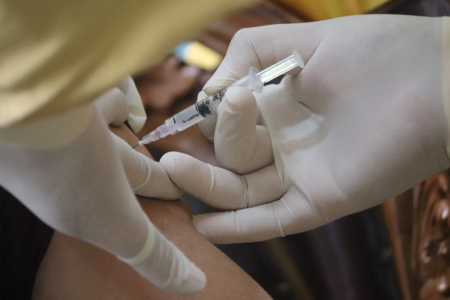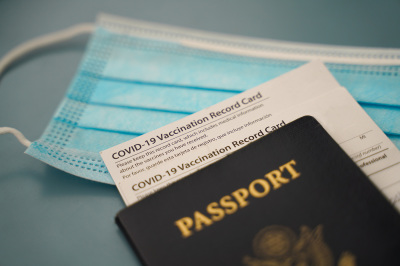Trump appointee upholds Indiana University's COVID-19 vaccine mandate

Indiana University’s COVID-19 vaccination mandate was recently upheld when a federal judge sided with the university over eight students who claimed the requirement is "unconstitutional."
In a Sunday ruling, Judge Damon Leichty of the U.S. District Court of the Northern District of Indiana rejected the students' motion for a preliminary injunction allowing the state's flagship university to uphold its vaccine requirement while the lawsuit is adjudicated.
"Even assuming in certain respects irreparable harm and an inadequate remedy at
law, the students here haven’t established a likelihood of success on the merits of their
Fourteenth Amendment due process claim, or that the balance of harms or the public’s
interest favors the extraordinary remedy of a preliminary injunction, before a trial on the
merits," the judge wrote.
Indiana University, a public research institution based in Bloomington, Ind., announced the vaccine mandate in May, requiring all students, faculty and staff to be fully vaccinated or have an approved exemption by Aug. 15 or upon returning to campus.
If a student is granted an “extremely limited” religious or medical exemption, they will be subject to additional requirements for not receiving the vaccine. These include testing twice a week, a mandatory quarantine if exposed to someone who tests positive, mandatory face masks in public spaces and mandatory return to their home address if the campus has a virus outbreak.
If unvaccinated students with an exemption fail to comply with these requirements, the plaintiffs claim they face “disciplinary action up to and including dismissal or termination from the university.”
Students who do not meet exemption requirements and refuse to receive the vaccine will have their class registration canceled, card access and access to IU systems terminated and can not participate in any on-campus activities.
The lawsuit alleged the university’s mandate violates the 14th Amendment of the U.S. Constitution, which includes rights of personal autonomy, bodily integrity and the right to reject medical treatment.
Plaintiffs also claim the mandate is a violation of Indiana’s vaccine passport law that prohibits state and local entities from requiring vaccine “passports” or immunization status. The law also specifies there should be no negative consequence for not producing an immunization record.

The Trump-appointed judge ruled it is in the “legitimate interest of public health” to uphold the university’s vaccine mandate.
The legal team for the eight graduate and undergraduate students filing the lawsuit, America’s Frontline Doctors and the Bopp Law Firm, appealed the judge’s decision on Tuesday.
“Continuing our fight against this unconstitutional mandate is necessary to guarantee that IU students receive the fair due process they’re owed by a public university,” James Bopp, Jr., director of litigation for America’s Frontline Doctors and lead counsel in the lawsuit, said in a statement.
The appeal asked the district court to prevent IU from upholding the vaccination requirement while the appeal is pending.
“An admitted IU student’s right to attend IU cannot be conditioned on the student waiving their rights to bodily integrity, bodily autonomy, and consent to medical treatment like IU has done here,” Bopp continued.
“IU’s Mandate did not properly balance the risks (both known and unknown) of the COVID vaccine to college-age students against the risks of COVID itself to that population and that college-aged students have a very low risk of adverse effects from a COVID infection."
Dr. Simone Gold, the founder of America’s Frontline Doctors, reiterated that the organization will continue to “pursue equal justice for all students and all people according to the rule of law.”
“We are troubled to see the Court show any hesitation in their resolve to recognize and protect each person’s sovereignty over their own body,” Gold said in a statement. "Voluntary consent to receiving medications is black letter law since World War II.”
Gold said it is “unreasonable and unethical” to mandate or coerce students to take a new vaccine lacking long-term safety data.
“In a time when information is spread faster and farther than any previous point in history, it is critical that those in positions of authority are thorough and factual in their consideration of the data relevant to the policies they seek to implement,” Gold continued. “No fact could be more relevant to the issue of student vaccine mandates than the statistically near zero risk to the students themselves.”
The Christian Post reached out to IU for comment but did not receive a response by press time.
More public and private universities across the country have imposed COVID-19 vaccine requirements on their students for the fall even though COVID-19 vaccines have only received emergency use authorization from the Food and Drug Administration. The vaccines have not yet received full approval. Parents and students are speaking out in opposition to these vaccine mandates.
Olivia Sandor, a rising college freshman who planned to attend Brigham Young University-Hawaii, was recently denied a medical exemption for the vaccine despite having a rare and life-threatening condition. She can no longer attend her dream university because of the school's vaccine mandate and the denied medical exemption.
Dr. Robert Malone, an mRNA vaccine technology pioneer, has warned that reports have linked the vaccine to heart inflammation and other health problems.
Malone appeared on Fox News last month to discuss his concerns about the vaccine for those who are not at as high of a risk for COVID-19, like children and young adults.
"[O]ne of my concerns are that the government is not being transparent with us about what those risks are," Malone said. "And so, I am of the opinion that people have the right to decide whether to accept vaccines or not, especially since these are experimental vaccines."
The CDC released an update last week which lists anaphylaxis, thrombosis with thrombocytopenia syndrome, myocarditis and pericarditis and even death as adverse but extremely rare side effects of COVID-19 vaccines.
The CDC is also tracking cases of heart inflammation associated with the mRNA coronavirus vaccine.
Emily Wood is a reporter for The Christian Post. She can be reached at: emily.wood@christianpost.com





















